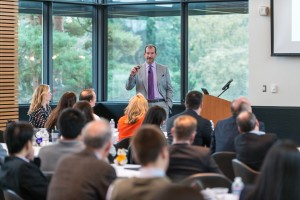A business by any other name: The transformation of Outerwall
 Two years ago, Coinstar Inc., known for its eponymous coin conversion kiosks as well as the movie rental kiosks Redbox, found itself in stasis. Addressing a packed Anthony’s Forum during his Leaders to Legends talk, CEO Scott Di Valerio put it this way, “Think about a company that has two businesses that grew rapidly and then have hit a level of maturity, that’s where we were two years ago.” He knew it was time to shake things up—a process that included a name-change (Coinstar became Outerwall in 2013), renewed focus and vision, and leveraging customer data—all while maintaining their unique company culture. During his time at the podium, Di Valerio expanded upon the three latter aspects, explaining how each one plays a pivotal role in the story of Outerwall.
Two years ago, Coinstar Inc., known for its eponymous coin conversion kiosks as well as the movie rental kiosks Redbox, found itself in stasis. Addressing a packed Anthony’s Forum during his Leaders to Legends talk, CEO Scott Di Valerio put it this way, “Think about a company that has two businesses that grew rapidly and then have hit a level of maturity, that’s where we were two years ago.” He knew it was time to shake things up—a process that included a name-change (Coinstar became Outerwall in 2013), renewed focus and vision, and leveraging customer data—all while maintaining their unique company culture. During his time at the podium, Di Valerio expanded upon the three latter aspects, explaining how each one plays a pivotal role in the story of Outerwall.
Know thy customer
When discussing Outerwall’s marketing strategy, Di Valerio made it clear that data is king. After the company name-change, Outerwall purchased a NASCAR truck and began regularly sponsoring banners in Seahawks and Sounders games. These decisions, Di Valerio revealed, are driven by data that indicate high brand loyalty among sports fans—a key factor when deciding who to market to. “When we took a look at where to push our product brands, and our demographic, and our consumers,” Di Valerio argued, “sports is the highest return area for us to go.” Outerwall also invested in a CRM system, enabling the company to begin sending targeted emails, track user behavior, and provide incentives for customers who haven’t used a Redbox kiosk in a while. Likewise, customer data can also be the reason to end a service. When answering a question on Outerwall’s decision to shut-down the short-lived streaming service Redbox Instant, Di Valerio points to the data that reveals Redbox customers to be transaction-based and more interested in new release movies—something subscription-based services cannot provide.
Focus
Every action Outerwall takes must fit within its four strategic pillars:
1) Lead in automated retail
2) Optimize core business
3) Grow business probability and
4) Invest in strategic platforms.
One such action is their investment in ecoATM, a kiosk that enables users to sell their old mobile devices (cell phones, mp3 players, and tablets) for cash. In support of the venture, Di Valerio points to other mobile buy-back programs like mail-in services, store credit offers, and online classified ad. All of which, Di Valerio argues, is not exactly customer-friendly, stating “the number one thing people want from their used electronics…is cash, not store credit or credit on their bill.” By deploying ecoATM, Outerwall will continue to leverage automated technology while delivering a service that no one else can provide.
Strong company culture
As CEO to a company with over 2500 employees, Di Valerio sees his role as chief “encourager” of sorts, promoting teamwork and removing roadblocks that impede innovation. To this end, he keeps his hiring philosophy pretty simple, stating “Hire people that can take your job and don’t be intimated by it.”
Outerwall also maintains an environment of giving, with over a third of Outerwall employees regularly volunteering at charitable organizations (the company matches employee volunteer hours and contributions). The company also donates 1 percent of its after-tax profits to non-profits, a move that Di Valerio says works double-time, creating a positive workplace while attracting a “different kind” of investor/shareholder.
While it may take several years to truly understand the implications of Outerwall’s transformation, it is clear that Di Valerio is very excited about the direction his company is taking and will continue to, in his own words, “find a better way for a better every day.”
Watch the full lecture
1 Response
Leave a Reply
You must be logged in to post a comment.

You focused more on the Redbox video rentals and ecoATM, but mentioned coin changers as well. I would not have thought changing coins, unless you keep a substantial amount of the exchange value, could be a business. People normally expect a dollar back when they change a dollar, only in different coin denominations … He sure is right about hiring people that might have the power and intellect to take your job … but that’s easy when you are at the top. The problem with most companies that middle management will try to avoid such decisions as they could see their chances dwindle in that process.